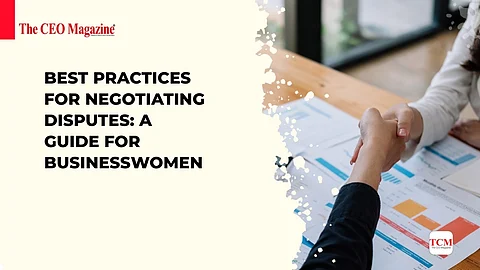
- News
- Women
- Magazine
- IndustryIndustry
- InsightsInsights
- Success Stories
- PublishPublish
- ContactContact
- Media KitMedia Kit

Best Practices for Negotiating Disputes: A Guide for Businesswomen
Negotiating disputes can be a daunting task for anyone, but for businesswomen, it often comes with unique challenges and opportunities. Whether it’s dealing with workplace conflicts, contract disputes, or vendor disagreements, effective negotiation skills are essential for achieving favorable outcomes. This article outlines best practices that empower businesswomen to navigate disputes with confidence and success.
Preparation is the cornerstone of successful negotiation. Take the time to understand the specifics of the dispute, gather relevant documents, and research the other party's interests and positions. Familiarize yourself with industry standards and practices that may influence the negotiation process.
Key Steps:
Identify the key issues at stake.
List your goals and priorities.
Anticipate the other party's objectives and possible objections.
Before entering negotiations, define what you want to achieve. Having clear objectives helps to maintain focus during discussions and provides a benchmark for evaluating proposals.
Considerations:
Determine your ideal outcome and what you can compromise on.
Establish non-negotiables that you are unwilling to concede.
Effective negotiation relies on open and transparent communication. Create an environment where both parties feel comfortable expressing their views. Listen actively and encourage dialogue to better understand the other party’s perspective.
Techniques:
Use open-ended questions to gather information.
Paraphrase what the other party says to show understanding.
Establishing a positive relationship can facilitate smoother negotiations. Take the time to connect on a personal level, which can help in reducing tension and building trust. A collaborative atmosphere often leads to more constructive discussions.
Approaches:
Find common ground or shared interests.
Use positive body language and maintain eye contact.
Emotions can run high during negotiations, especially in disputes. It’s crucial to remain calm and professional, regardless of the circumstances. Keeping your emotions in check allows you to think clearly and respond appropriately.
Tips:
Take deep breaths or pause if you feel overwhelmed.
Avoid personal attacks or negative language.
Instead of getting stuck in rigid positions, focus on the underlying interests that drive both parties’ demands. This approach can lead to creative solutions that satisfy both sides, transforming a potentially adversarial situation into a collaborative problem-solving effort.
Strategies:
Ask “why” to uncover underlying needs.
Explore alternative options that could satisfy both parties.
When discussing potential solutions, refer to objective criteria or standards to support your position. This can help to keep the negotiation grounded and reduce personal biases.
Examples:
Industry benchmarks.
Legal guidelines or contractual obligations.
One of the most powerful negotiating tactics is the willingness to walk away if your minimum requirements are not met. Knowing your limits helps you avoid unfavorable agreements and can sometimes lead to better offers from the other party.
Considerations:
Identify your BATNA (Best Alternative to a Negotiated Agreement).
Be prepared to leave the negotiation if it’s not progressing favorably.
After reaching an agreement, ensure that all terms are documented clearly and followed up with the other party. This not only reinforces the commitment but also helps to avoid misunderstandings in the future.
Action Steps:
Draft a written summary of the agreement.
Schedule a follow-up meeting to ensure compliance and address any further issues.
Negotiating disputes is a vital skill for businesswomen that can lead to better professional relationships and successful outcomes. By preparing thoroughly, fostering open communication, and focusing on interests, women can navigate negotiations with confidence. Adopting these best practices will empower businesswomen to tackle disputes effectively and achieve their objectives.
Follow us on Google News
